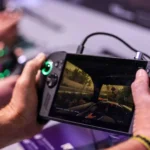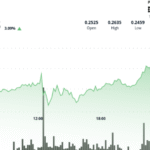In a bold move to redefine the role of digital assets, leading NFT marketplace OpenSea has unveiled a new initiative, the Flagship Collection, backed by a substantial $1 million investment aimed at acquiring and curating significant digital artworks. This announcement, made on September 8, 2025, positions the company as a key player in both the NFT realm and the broader cultural landscape surrounding digital art.
The Flagship Collection represents OpenSea’s first formal endeavor to curate digital artifacts, signalling a shift in perspective from viewing NFTs merely as speculative investments to recognizing them as cultural treasures. Purchases made under this initiative will be celebrated as “acquisition moments” to engage and educate collectors, showcasing how these pieces contribute to a rich tapestry of digital culture.
The initiative is characterized by a committee-driven selection process, comprising OpenSea employees and external advisors to ensure transparency and integrity in decision-making. The company has put strict controls in place to prevent conflicts of interest, mandating that any committee member with financial stakes in a project must recuse themselves from the evaluation process.
The inaugural piece of the collection is the iconic CryptoPunk #5273, acquired for 65 ETH, which was valued at approximately $285,000 at the time of the purchase. Dubbed the “OpenSea Punk,” this piece is intended to symbolize the independent spirit prevalent in the early days of the NFT movement. According to Adam Hollander, OpenSea’s chief marketing officer, the initiative aims to juxtapose works by emerging artists with historically significant tokens, as part of a longer-term goal to create a “living museum” that embodies the evolution of digital arts.
In a blog post released alongside the initiative, OpenSea emphasizes the importance of NFTs as foundational components of future digital culture, arguing that future generations will recognize their role in shaping the evolution of digital creativity. The company also reassured stakeholders about its strategy of long-term asset holding, emphasizing that any future sales would occur under rare circumstances.
However, the announcement quickly caught the attention of the crypto community, with many focusing on OpenSea’s forthcoming SEA token launch, anticipated to re-energize its competitive stance in an increasingly crowded market. Once the dominant platform for NFT trading, OpenSea has faced mounting competition from platforms like Blur and Magic Eden.
In July, OpenSea strengthened its mobile capabilities by acquiring Rally, a mobile-first Web3 platform. This acquisition aligns with the company’s vision to create an “onchain everything app” that facilitates seamless trading of NFTs, tokens, and more on a single mobile-native platform. Rally’s co-founders have joined OpenSea’s leadership, which signals a dedicated push towards enhancing mobile trading experiences.
This latest initiative follows a series of strategic updates in the wake of a favorable regulatory outcome. In February, the U.S. Securities and Exchange Commission concluded its investigation into OpenSea, which had examined allegations that the marketplace functioned as an unregistered exchange. OpenSea co-founder Devin Finzer described this clearance as a significant victory for the NFT community, with other industry leaders supporting this sentiment.
Despite the ambitious initiatives and improvements, the NFT market’s recovery remains uneven. Recent data indicated fluctuating sales figures, ranging from $115.4 million to $170.5 million during the summer months, but dipping to $92 million in September. As OpenSea sets out to carve a new path for digital ownership and culture, all eyes will be on the platform’s ability to navigate these challenges and effectively lead the evolving NFT landscape.







